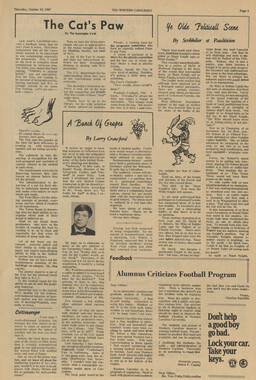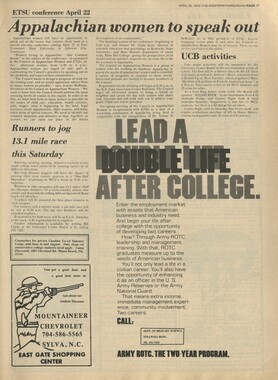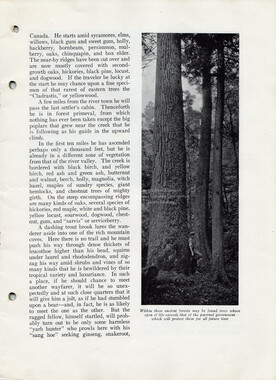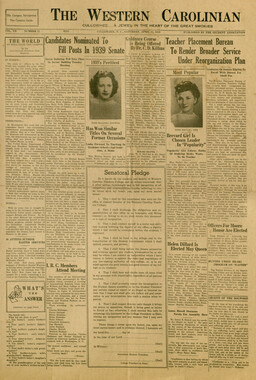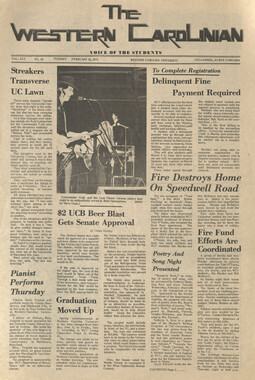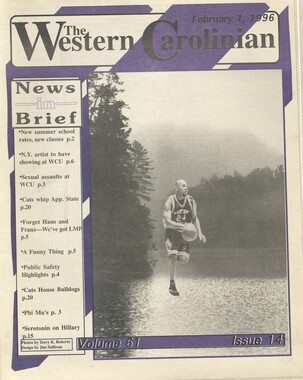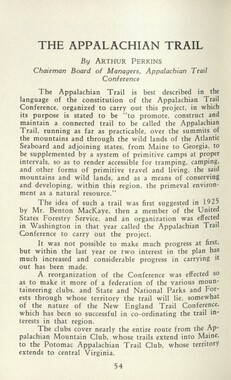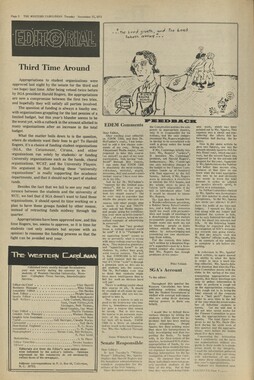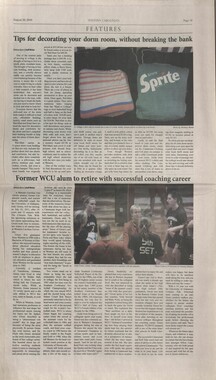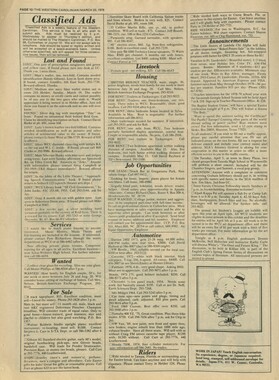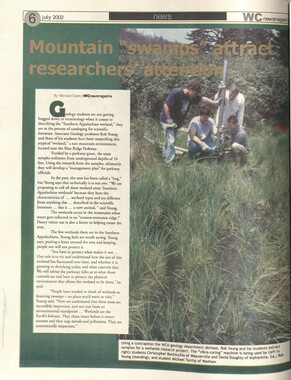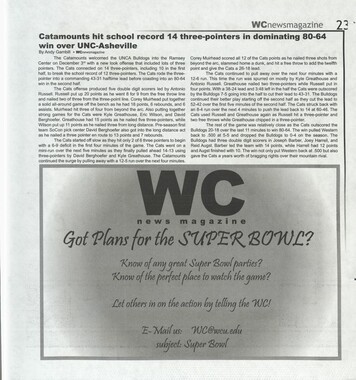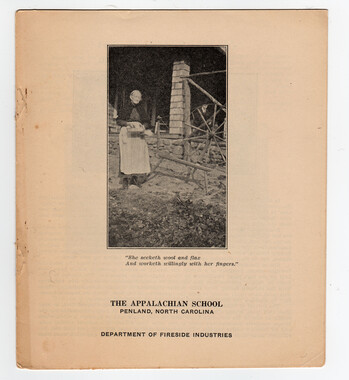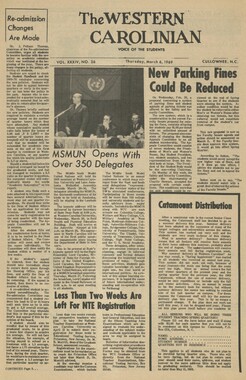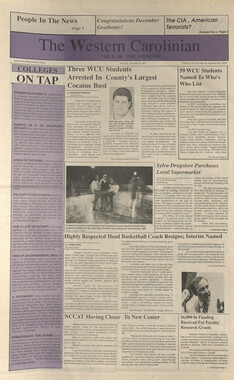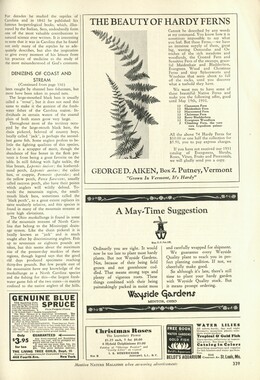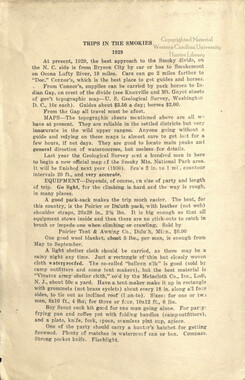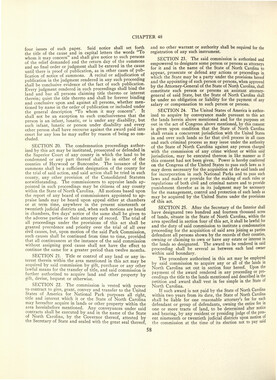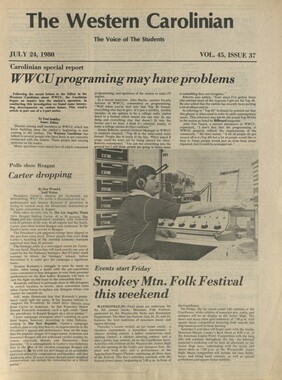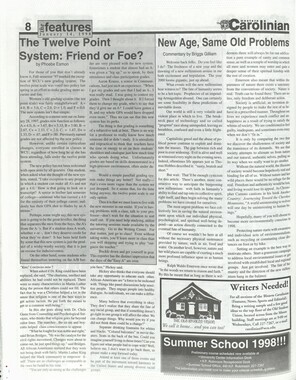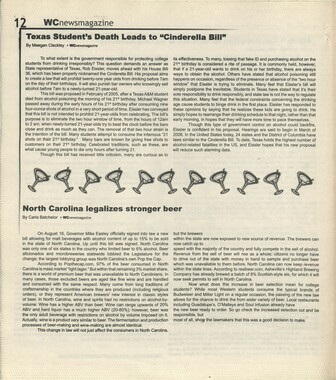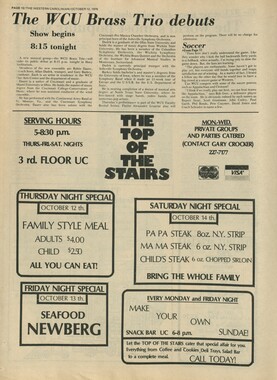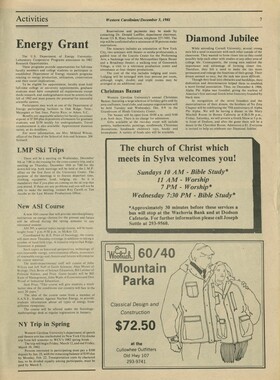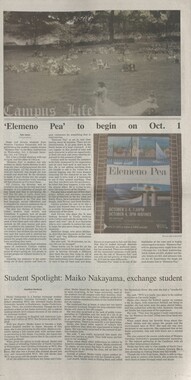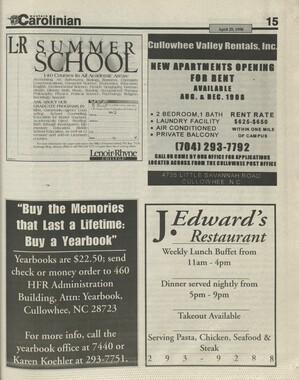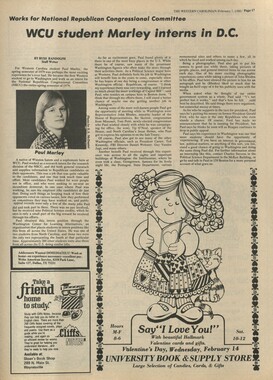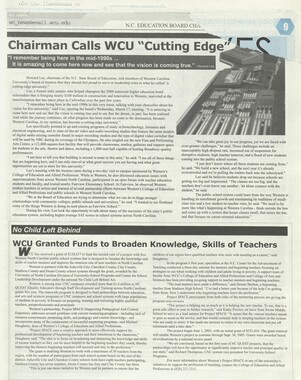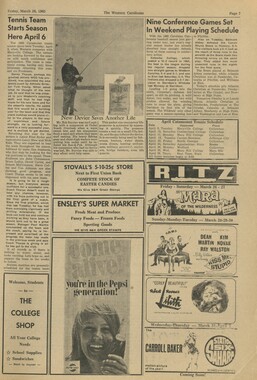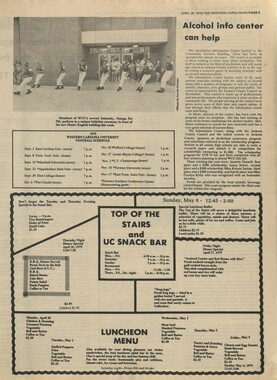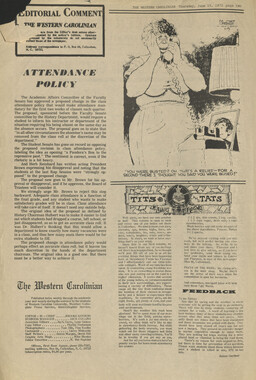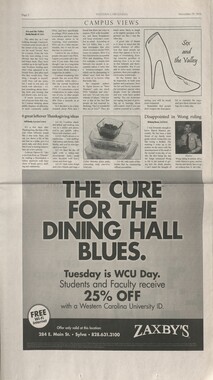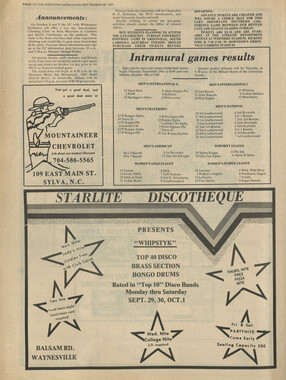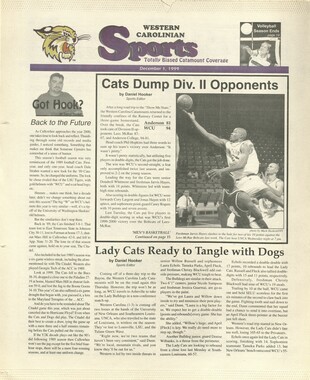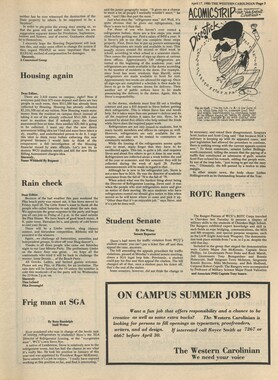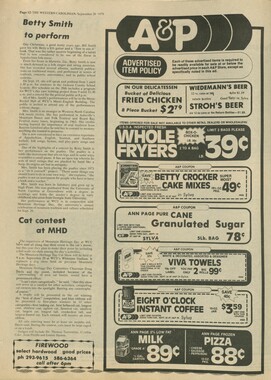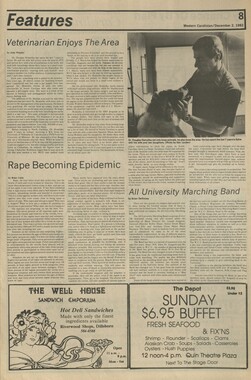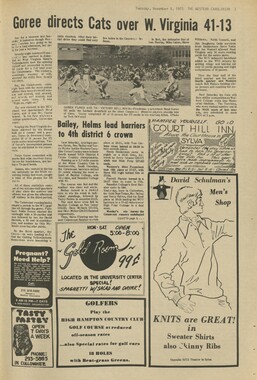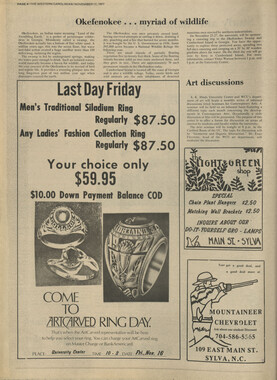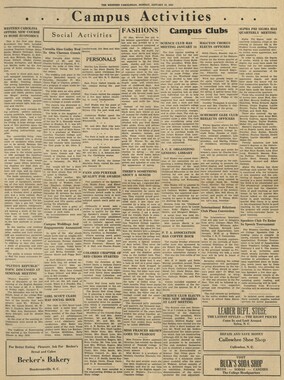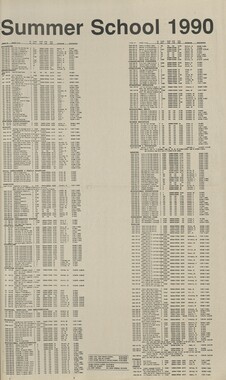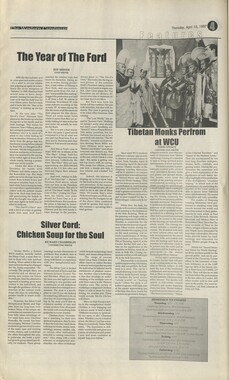Western Carolina University (21)
View all
- Canton Champion Fibre Company (2308)
- Cherokee Traditions (291)
- Civil War in Southern Appalachia (165)
- Craft Revival (1942)
- George Masa Collection (137)
- Great Smoky Mountains - A Park for America (3080)
- Highlights from Western Carolina University (422)
- Horace Kephart (973)
- Journeys Through Jackson (159)
- LGBTQIA+ Archive of Jackson County (89)
- Oral Histories of Western North Carolina (318)
- Picturing Appalachia (6617)
- Stories of Mountain Folk (413)
- Travel Western North Carolina (153)
- Western Carolina University Fine Art Museum Vitreograph Collection (129)
- Western Carolina University Herbarium (92)
- Western Carolina University: Making Memories (738)
- Western Carolina University Publications (2491)
- Western Carolina University Restricted Electronic Theses and Dissertations (146)
- Western North Carolina Regional Maps (71)
- World War II in Southern Appalachia (131)
University of North Carolina Asheville (6)
View all
- Allanstand Cottage Industries (62)
- Appalachian National Park Association (53)
- Bennett, Kelly, 1890-1974 (1463)
- Berry, Walter (76)
- Brasstown Carvers (40)
- Carver, George Washington, 1864?-1943 (26)
- Cathey, Joseph, 1803-1874 (1)
- Champion Fibre Company (233)
- Champion Paper and Fibre Company (297)
- Cherokee Indian Fair Association (16)
- Cherokee Language Program (22)
- Crowe, Amanda (40)
- Edmonston, Thomas Benton, 1842-1907 (7)
- Ensley, A. L. (Abraham Lincoln), 1865-1948 (275)
- Fromer, Irving Rhodes, 1913-1994 (70)
- George Butz (BFS 1907) (46)
- Goodrich, Frances Louisa (120)
- Grant, George Alexander, 1891-1964 (96)
- Heard, Marian Gladys (60)
- Kephart, Calvin, 1883-1969 (15)
- Kephart, Horace, 1862-1931 (313)
- Kephart, Laura, 1862-1954 (67)
- Laney, Gideon Thomas, 1889-1976 (439)
- Masa, George, 1881-1933 (61)
- McElhinney, William Julian, 1896-1953 (44)
- Niggli, Josephina, 1910-1983 (10)
- North Carolina Park Commission (105)
- Osborne, Kezia Stradley (9)
- Owens, Samuel Robert, 1918-1995 (11)
- Penland Weavers and Potters (36)
- Roberts, Vivienne (15)
- Roth, Albert, 1890-1974 (142)
- Schenck, Carl Alwin, 1868-1955 (1)
- Sherrill's Photography Studio (2565)
- Southern Highland Handicraft Guild (127)
- Southern Highlanders, Inc. (71)
- Stalcup, Jesse Bryson (46)
- Stearns, I. K. (213)
- Thompson, James Edward, 1880-1976 (226)
- United States. Indian Arts and Crafts Board (130)
- USFS (683)
- Vance, Zebulon Baird, 1830-1894 (1)
- Weaver, Zebulon, 1872-1948 (58)
- Western Carolina College (230)
- Western Carolina Teachers College (282)
- Western Carolina University (2008)
- Western Carolina University. Mountain Heritage Center (18)
- Whitman, Walt, 1819-1892 (10)
- Wilburn, Hiram Coleman, 1880-1967 (73)
- Williams, Isadora (3)
- Cain, Doreyl Ammons (0)
- Crittenden, Lorraine (0)
- Rhodes, Judy (0)
- Smith, Edward Clark (0)
- Appalachian Region, Southern (3032)
- Asheville (N.C.) (1945)
- Avery County (N.C.) (26)
- Blount County (Tenn.) (195)
- Buncombe County (N.C.) (1680)
- Cherokee County (N.C.) (283)
- Clay County (N.C.) (556)
- Graham County (N.C.) (238)
- Great Smoky Mountains National Park (N.C. and Tenn.) (525)
- Haywood County (N.C.) (3573)
- Henderson County (N.C.) (70)
- Jackson County (N.C.) (4925)
- Knox County (Tenn.) (35)
- Knoxville (Tenn.) (13)
- Lake Santeetlah (N.C.) (10)
- Macon County (N.C.) (421)
- Madison County (N.C.) (216)
- McDowell County (N.C.) (39)
- Mitchell County (N.C.) (135)
- Polk County (N.C.) (35)
- Qualla Boundary (982)
- Rutherford County (N.C.) (78)
- Swain County (N.C.) (2185)
- Transylvania County (N.C.) (270)
- Watauga County (N.C.) (12)
- Waynesville (N.C.) (86)
- Yancey County (N.C.) (72)
- Aerial Photographs (3)
- Aerial Views (60)
- Albums (books) (4)
- Articles (1)
- Artifacts (object Genre) (228)
- Bibliographies (1)
- Biography (general Genre) (2)
- Cards (information Artifacts) (38)
- Clippings (information Artifacts) (192)
- Copybooks (instructional Materials) (3)
- Crafts (art Genres) (622)
- Depictions (visual Works) (21)
- Design Drawings (1)
- Digital Moving Image Formats (2)
- Drawings (visual Works) (185)
- Envelopes (101)
- Exhibitions (events) (1)
- Facsimiles (reproductions) (1)
- Fiction (general Genre) (4)
- Financial Records (12)
- Fliers (printed Matter) (67)
- Glass Plate Negatives (381)
- Guidebooks (2)
- Internegatives (10)
- Interviews (823)
- Land Surveys (102)
- Letters (correspondence) (1045)
- Manuscripts (documents) (618)
- Maps (documents) (177)
- Memorandums (25)
- Minutes (administrative Records) (59)
- Negatives (photographs) (6090)
- Newsletters (1290)
- Newspapers (2)
- Notebooks (8)
- Occupation Currency (1)
- Paintings (visual Works) (1)
- Pen And Ink Drawings (1)
- Periodicals (194)
- Personal Narratives (10)
- Photographs (12977)
- Plans (maps) (1)
- Poetry (6)
- Portraits (4568)
- Postcards (329)
- Programs (documents) (181)
- Publications (documents) (2444)
- Questionnaires (65)
- Relief Prints (26)
- Sayings (literary Genre) (1)
- Scrapbooks (282)
- Sheet Music (2)
- Slides (photographs) (402)
- Songs (musical Compositions) (2)
- Sound Recordings (802)
- Specimens (92)
- Speeches (documents) (18)
- Tintypes (photographs) (8)
- Transcripts (329)
- Text Messages (0)
- A.L. Ensley Collection (275)
- Appalachian Industrial School Records (7)
- Appalachian National Park Association Records (336)
- Axley-Meroney Collection (2)
- Bayard Wootten Photograph Collection (20)
- Bethel Rural Community Organization Collection (7)
- Blumer Collection (5)
- C.W. Slagle Collection (20)
- Canton Area Historical Museum (2110)
- Carlos C. Campbell Collection (462)
- Cataloochee History Project (64)
- Cherokee Studies Collection (4)
- Daisy Dame Photograph Album (5)
- Daniel Boone VI Collection (1)
- Doris Ulmann Photograph Collection (112)
- Elizabeth H. Lasley Collection (1)
- Elizabeth Woolworth Szold Fleharty Collection (4)
- Frank Fry Collection (95)
- George Masa Collection (173)
- Gideon Laney Collection (452)
- Hazel Scarborough Collection (2)
- Hiram C. Wilburn Papers (28)
- Historic Photographs Collection (236)
- Horace Kephart Collection (861)
- Humbard Collection (33)
- Hunter and Weaver Families Collection (1)
- I. D. Blumenthal Collection (4)
- Isadora Williams Collection (4)
- Jesse Bryson Stalcup Collection (47)
- Jim Thompson Collection (224)
- John B. Battle Collection (7)
- John C. Campbell Folk School Records (80)
- John Parris Collection (6)
- Judaculla Rock project (2)
- Kelly Bennett Collection (1482)
- Love Family Papers (11)
- Major Wiley Parris Civil War Letters (3)
- Map Collection (12)
- McFee-Misemer Civil War Letters (34)
- Mountain Heritage Center Collection (4)
- Norburn - Robertson - Thomson Families Collection (44)
- Pauline Hood Collection (7)
- Pre-Guild Collection (2)
- Qualla Arts and Crafts Mutual Collection (12)
- R.A. Romanes Collection (681)
- Rosser H. Taylor Collection (1)
- Samuel Robert Owens Collection (94)
- Sara Madison Collection (144)
- Sherrill Studio Photo Collection (2558)
- Smoky Mountains Hiking Club Collection (616)
- Stories of Mountain Folk - Radio Programs (374)
- The Reporter, Western Carolina University (510)
- Venoy and Elizabeth Reed Collection (16)
- WCU Gender and Sexuality Oral History Project (36)
- WCU Mountain Heritage Center Oral Histories (25)
- WCU Oral History Collection - Mountain People, Mountain Lives (71)
- WCU Students Newspapers Collection (1923)
- Western North Carolina Tomorrow Black Oral History Project (69)
- William Williams Stringfield Collection (2)
- Zebulon Weaver Collection (109)
- African Americans (390)
- Appalachian Trail (35)
- Artisans (521)
- Cherokee art (84)
- Cherokee artists -- North Carolina (10)
- Cherokee language (21)
- Cherokee pottery (101)
- Cherokee women (208)
- Church buildings (190)
- Civilian Conservation Corps (U.S.) (111)
- College student newspapers and periodicals (2012)
- Dams (108)
- Dance (1023)
- Education (222)
- Floods (63)
- Folk music (1015)
- Forced removal, 1813-1903 (2)
- Forest conservation (220)
- Forests and forestry (1198)
- Gender nonconformity (4)
- Great Smoky Mountains National Park (N.C. and Tenn.) (181)
- Hunting (47)
- Landscape photography (25)
- Logging (122)
- Maps (83)
- Mines and mineral resources (9)
- North Carolina -- Maps (18)
- Paper industry (38)
- Postcards (255)
- Pottery (135)
- Railroad trains (72)
- Rural electrification -- North Carolina, Western (3)
- School integration -- Southern States (2)
- Segregation -- North Carolina, Western (5)
- Slavery (5)
- Sports (452)
- Storytelling (243)
- Waterfalls -- Great Smoky Mountains (N.C. and Tenn.) (66)
- Weaving -- Appalachian Region, Southern (280)
- Wood-carving -- Appalachian Region, Southern (328)
- World War, 1939-1945 (173)
Western Carolinian Volume 74 Number 03 (04)
Item
Item’s are ‘child’ level descriptions to ‘parent’ objects, (e.g. one page of a whole book).
-
-
TCR ie PR ae I Page 5 WESTERN CAROLINIAN September 26, 2008 FEATURES HONORS COLLEGE CALENDAR THE GREEN LIGHT: The Peak Oil Challenge By Curt Collins Octob er Contributing Writer 29 Movie Night Lately there has Reynolds Lobby been a lot of conversation out 8:00 pm in Jackson County, and media 31 Halloween Party attention about the use of oil, what we are forced to engage in to secure it for our coun- Reynolds Lobby try, its limited availability 8:00 pm and how do we get off of it. What would we do, as a soci- November ety if the prices continued to skyrocket and the supply con- y Rea ding Day (io classe) tinued to decrease? Because S Movie Night the reality of it is that this is happening, and I fear that the prices will not return to what Reynolds Lobby we were used to because that 8:00 pm is not the direction they usu- V for Vendetta ally go. The Peak Oil prob- lem appears to be a certainty for our country and the world sometime in the future. At home the U.S is producing almost less than half of the oil we were just back in the 1980s: from 8,686 barrels per day in 1983 to 5,097 in August 2008 (U.S. Weekly Supply). This much of a drop in production is news to me. The Peak Oil Theory, devel- oped by M. King Hubbert in 1949, says that at some point in the future we will reach the maximum amount of oil produced in the world, after which it will decline. All the while our use of petroleum will be increasing and our population will be too. There is a docu- mentary titled The Power of Community: How Cuba Sur- vived Peak Oil. It is available in Hunter Library at Western and | recommend it to you. The film showed ways to accomplish what would be 11 ~ Chili-Cookoff/Game Night Reynolds Lobby 6:00 pm 19 Movie Night Reynolds Lobby 8:00 pm and content society, with very GEOLOGY IN THE BAHAMAS By Jordan Monroe Staff Writer Geology majors: pay at- tention! Here is a unique op- portunity to travel to a beau- tiful location and learn about geology and biology. Blair Tormey is taking a class to San Salvador Island, Bahamas, May 11-22, 2009. Its officially called GEOL 140 SAN SAL: Environ- ments of the Bahamas. This is a two-week intro- ductory liberal arts course to study the ecology of the island and the human affects on the ecosystem. You will explore many environments, such as caves, coral reefs, beaches, and bird and reptile colonies. Blair Tormey has been tak- ing students to the Bahamas since 2006, but has been do- ing research there since 1997. He says, One of the benefits to studying geology in the Bahamas is that the sediments of the islands are extremely sensitive to changes in the ocean, biologic community, and climate. Any changes made to the environment on the islands will be observable in the geology. The students are literally immersed in the environment, and gain a bet- ter understanding of its com- plex and fragile nature. This class is open to everyone at all levels and majors. No prerequisites are required. The course is $1600 plus summer tuition which in- cludes airfare, housing, food, materials, and transportation. Snorkeling gear will need to be bought separately, which goes for about $100, and you might want to bring money for snacks and souvenirs. You want to make this decision fast: the first $500 deposit is due January 30, 2009. You can contact Blair Tormey at btormey@wcu. edu or 828-227-3916 and Su- san Barbour-Wood at susan- wood@wcu.edu. little to no oil use. Cuba confronted its own Peak Oil crisis recently in the early 1990s when the Soviet Union fell apart and could no longer support the island nation with oil. Cubas economy suffered a 34% crash in GDP and an 80% drop in exports. This mani- fested itself in many ways in the country, one of them being the health status of its people: children became quickly malnutritioned; pregnant women became anemic, birth weight de- clined and Cu- ban citizens lost an average of 20 pounds per person! Add to this the decline in employment and available materials for doing just about anything and society as you know it is no longer. But they handled it, and as humans can easily do, they overcame their problems with a superior sys- tem to the prior one. They imported a million and a half bicycles and built half a million. They converted trucks into large taxis and used semis to pull enormous buses in order to transport everyone. Garden- ing and local food production became a necessity, univer- sities became decentralized, commuting distances drasti- cally decreased, architecture took on a low energy focus, all things based on oil had to be reworked in their civiliza- tion. Through this com- plete changing of their so- ciety they also reaped enor- mous side benefits. The average Cuban use 1/8th the amount of energy compared to the average American; this immediately translates into money (more of it for them and less for us) a decrease in pollution, and less messy pol- itics (Cuba has zero imported foreign energy resources). There was a national de- crease in diabetes, heart at- necessary, on a large level, in... tacks and: strokes due to, an order to still have a modern... increase in activity levels and. a healthier food supply for all Cuban citizens. The film also spoke of the increase in. community (as evidenced by greater sharing of resources, co-educating, volunteering, etc.) and a rise in education rates leading to a doctor pa- tient ratio of 57/1,000 con- trasted with 28/1,000 in the United States. It is too bad that we did not heed our own federal governments movies like When The Circuit Breaks. This was made on our tax dollar and released for us to know about the finite gas sup- ply. The film states, ...with a crisis that could recur and recur unless the entire coun- try recognizes the dangers of a quite real energy shortage. That was released during the gas crisis in the 1970s and now that sentence has been proven correct. We are living the recurrence. Then there was President Carter who began a new en- ergy policy with tax credits for alternative energy use and CAFE (Corporate Average Fuel Economy) standards to make automobile manufac- turers build more fuel-effi- cient vehicles. Unfortunately his ideas were rolled back by his successor Ronald Rea- gan. If we are not some- what ready for worldwide Peak Oil, and its subsequent decline, we will not be able to easily handle it when it comes. Preparing for it is thankfully already happen- ing in the good ol USA, and we could advance its rate ex- ponentially if we wanted to. We all have a chance in a few weeks to vote for more secure _ energy production. Check outs: the candidates for all offices jc to see whom you think will make the better choices for us all. 1.The Power Of Community: How Cuba Survived Peak Oil. Dir. Faith Morgan. Com- munity Service, Inc. 2006. 2. U.S. Weekly Supply Esti- mates. 10/01/2008. Energy Information Administration. October 4, 2008. http://tonto. eia.doe.gov/dnav/pet/hist/ werfpus2w.htm ELECTION RESULTSLIVE VIEWING NOVEMBER 4, 2008 6:00PM 1:00AM UC THEATER JOIN VARIOUS WCU GROUPS INCLUDING SGA, COLLEGE DEMOCRATS, & COLLEGE REPUBLICANS IN VIEWING THE RESULTS OF THIS MONUMENTAL ELECTION!
Object
Object’s are ‘parent’ level descriptions to ‘children’ items, (e.g. a book with pages).
-
The Western Carolinian is Western Carolina University's student-run newspaper. The paper was published as the Cullowhee Yodel from 1924 to 1931 before changing its name to The Western Carolinian in 1933.
-
![hl_westerncarolinian_2008-09-26[10-27]_vol74_no03[04]_05.jpg](/media/w320/wcu_publications/hl_westerncarolinian_2008-09-26[10-27]_vol74_no03[04]_05.jpg)
![hl_westerncarolinian_2008-09-26[10-27]_vol74_no03[04]_05.jpg](/media/w1000h500/wcu_publications/hl_westerncarolinian_2008-09-26[10-27]_vol74_no03[04]_05.jpg)
![hl_westerncarolinian_2008-09-26[10-27]_vol74_no03[04]_01.jpg](/media/w320/wcu_publications/hl_westerncarolinian_2008-09-26[10-27]_vol74_no03[04]_01.jpg)
![hl_westerncarolinian_2008-09-26[10-27]_vol74_no03[04]_02.jpg](/media/w320/wcu_publications/hl_westerncarolinian_2008-09-26[10-27]_vol74_no03[04]_02.jpg)
![hl_westerncarolinian_2008-09-26[10-27]_vol74_no03[04]_03.jpg](/media/w320/wcu_publications/hl_westerncarolinian_2008-09-26[10-27]_vol74_no03[04]_03.jpg)
![hl_westerncarolinian_2008-09-26[10-27]_vol74_no03[04]_04.jpg](/media/w320/wcu_publications/hl_westerncarolinian_2008-09-26[10-27]_vol74_no03[04]_04.jpg)
![hl_westerncarolinian_2008-09-26[10-27]_vol74_no03[04]_06.jpg](/media/w320/wcu_publications/hl_westerncarolinian_2008-09-26[10-27]_vol74_no03[04]_06.jpg)
![hl_westerncarolinian_2008-09-26[10-27]_vol74_no03[04]_07.jpg](/media/w320/wcu_publications/hl_westerncarolinian_2008-09-26[10-27]_vol74_no03[04]_07.jpg)
![hl_westerncarolinian_2008-09-26[10-27]_vol74_no03[04]_08.jpg](/media/w320/wcu_publications/hl_westerncarolinian_2008-09-26[10-27]_vol74_no03[04]_08.jpg)
![hl_westerncarolinian_2008-09-26[10-27]_vol74_no03[04]_09.jpg](/media/w320/wcu_publications/hl_westerncarolinian_2008-09-26[10-27]_vol74_no03[04]_09.jpg)
![hl_westerncarolinian_2008-09-26[10-27]_vol74_no03[04]_10.jpg](/media/w320/wcu_publications/hl_westerncarolinian_2008-09-26[10-27]_vol74_no03[04]_10.jpg)
![hl_westerncarolinian_2008-09-26[10-27]_vol74_no03[04]_11.jpg](/media/w320/wcu_publications/hl_westerncarolinian_2008-09-26[10-27]_vol74_no03[04]_11.jpg)
![hl_westerncarolinian_2008-09-26[10-27]_vol74_no03[04]_12.jpg](/media/w320/wcu_publications/hl_westerncarolinian_2008-09-26[10-27]_vol74_no03[04]_12.jpg)
![hl_westerncarolinian_2008-09-26[10-27]_vol74_no03[04]_13.jpg](/media/w320/wcu_publications/hl_westerncarolinian_2008-09-26[10-27]_vol74_no03[04]_13.jpg)
![hl_westerncarolinian_2008-09-26[10-27]_vol74_no03[04]_14.jpg](/media/w320/wcu_publications/hl_westerncarolinian_2008-09-26[10-27]_vol74_no03[04]_14.jpg)
![hl_westerncarolinian_2008-09-26[10-27]_vol74_no03[04]_15.jpg](/media/w320/wcu_publications/hl_westerncarolinian_2008-09-26[10-27]_vol74_no03[04]_15.jpg)
![hl_westerncarolinian_2008-09-26[10-27]_vol74_no03[04]_16.jpg](/media/w320/wcu_publications/hl_westerncarolinian_2008-09-26[10-27]_vol74_no03[04]_16.jpg)
